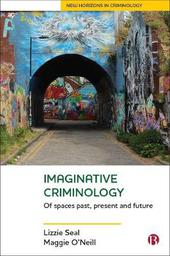
|
Imaginative Criminology: Of Spaces Past, Present and Future
Hardback
Main Details
| Title |
Imaginative Criminology: Of Spaces Past, Present and Future
|
| Authors and Contributors |
By (author) Lizzie Seal
|
|
By (author) Maggie O'Neill
|
| Series | New Horizons in Criminology |
|---|
| Physical Properties |
| Format:Hardback | | Pages:176 | | Dimensions(mm): Height 234,Width 156 |
|
| ISBN/Barcode |
9781529202687
|
| Classifications | Dewey:364 |
|---|
| Audience | | Professional & Vocational | |
|---|
| Illustrations |
No
|
|
Publishing Details |
| Publisher |
Bristol University Press
|
| Imprint |
Bristol University Press
|
| Publication Date |
10 July 2019 |
| Publication Country |
United Kingdom
|
Description
This distinctive and engaging book proposes an imaginative criminology, focusing on how spaces of transgression are lived, portrayed and imagined. These include spaces of control or confinement, including prison and borders, and spaces of resistance. Examples range from camps where asylum seekers and migrants are confined to the exploration of deviant identities and the imagined spaces of surveillance and control in young adult fiction. Drawing on oral history, fictive portrayals, walking methodologies, and ethnographic and arts-based research, the book pays attention to issues of gender, sexuality, age, ethnicity, mobility and nationality as they intersect with lived and imagined space.
Author Biography
Lizzie Seal is Reader in Criminology at University of Sussex. She researches in the areas of historical and cultural criminology. Maggie O'Neill is Professor in Sociology at University College Cork. She is an ethnographer who researches in the areas of cultural criminology, critical theory/feminist theory, biographic, participatory and arts based/walking methods, specifically in relation to sex work and (forced) migration.
Reviews''This is much more than a `methodology book'; it re-imagines what criminology might be. I already want to re-read... A book to inspire the novice and long-time criminologist in equal measure.'' Jennifer Fleetwood, Goldsmiths, University of London Jennifer Fleetwood, Goldsmiths, University of London. ''Dazzling in its methodological, conceptual and theoretical scope, the authors provide a compelling critical contribution to criminological analyses of time, space and place. This book is testament to the fact that criminology can be imaginative!'' Yvonne Jewkes, University of Bath
|